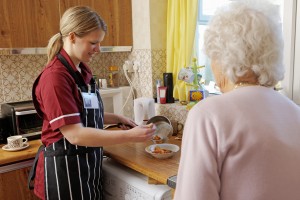Seniors have different nutritional needs than younger adults, and if this is not taken into account when planning meals for your elderly parents, the chances of malnutrition can go up considerably. Honestly, malnutrition can occur for many different reasons, and age can just be the backdrop under which it occurs. Things like physical disability, arthritis, dementia, diet restrictions such as those caused by diabetes or cholesterol problems, and even just living alone can subtly make changes in someone’s diet and cause them to eat in an unhealthy way. Although this might not be a huge problem for younger adults, in the elderly a change for the worse can end up being devastating to their health.
If you are worried about your elderly loved one’s diet, there are some easy things you can do to make sure that they are eating enough. The first thing you should do is to just observe. Take a look at what is in their fridge a few times per day, if possible. If you see them eat, take note of what is actually being consumed, and not just what is on the plate. Next, keep an eye on any changes in their health and any weight fluctuations. If they lose a lot of weight suddenly, take note of it. Also be sure to take note of what they are eating. A diet of gummy bears and soda isn’t going to be meeting their dietary needs, and is just setting them up for a whole different set of health concerns in the future. Eating enough, and eating enough of the right foods is one of the simplest ways to stay healthy for the elderly. You should also encourage them to be drinking a lot of water. Oftentimes dehydration and malnutrition go hand in hand. If they aren’t eating enough, odds are they are also not getting enough liquids in, too.
If they have an in-home care professional working with them or another caregiver, ask that individual to keep track of the above things as well. This will help you to gain a clear picture of what is actually occurring.
Also, don’t forget that lower amounts of activity will require fewer calories per day in order to maintain a healthy weight. Exercise is an important part of life, but the basic truth is that seniors don’t move around as much as middle aged adults do. When this happens, they will naturally require less food to keep their energy throughout the day. Many seniors believe that they do not have an appetite and that it’s okay to skip meals. This is not actually what is going on most of the time, though. Instead, many elderly find themselves not needing as much food to get through the day because they aren’t doing the same things that they used to do.
If you have further concerns about a loved one’s eating habits, make sure that you have your concerns plus all of your observations written down in one easy to reference place and consult with a phsyician.
The post Quick Guide to Beating Senior Malnutrition appeared first on Paradise In-Home Care.

No comments:
Post a Comment